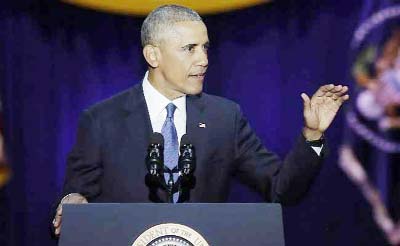
AFP, Washington :
US President Barack Obama on Thursday ended a five-decade-old open door policy for Cuba migrants, who will now face similar residency restrictions to other citizens from Latin America.
In one of his final acts before leaving the White House, Obama scrapped rules dating back to the 1960s which allowed those fleeing communist Cuba a fast track to US citizenship.
In a statement, Obama said the move would “bring greater consistency to our immigration policy.”
“Effective immediately, Cuban nationals who attempt to enter the United States illegally and do not qualify for humanitarian relief will be subject to removal, consistent with US law and enforcement priorities,” Obama said.
The Cold War-era policy had a wide-ranging impact, transforming both Cuba and the United States.
It enticed millions to flee the island, fueling economic stasis and a severe “brain drain.”
Meanwhile in the United States, the growing Cuban-American population become a potent political, cultural and economic force.
Today there are around 1.8 million Cuban-Americans. Two Republican 2016 presidential candidates, Marco Rubio and Ted Cruz, were of Cuban heritage.
Cuban issues are at the forefront of politics in the swing state of Florida, making generations of politicians extremely wary about revoking the policy or lifting economic sanctions against Havana.
But as Cuban-American politics has become less strident, the policy has come under pressure, with some viewing it as anachronistic and encouraging dangerous sea voyages in makeshift rafts.
That led president Bill Clinton in 1995 to close the door halfway. He decided Cubans intercepted at sea would be sent home, a policy that become known as “wetfoot/dryfoot.”
Obama’s decision means normal immigration rules will also apply to Cubans arriving at land borders.
Obama’s rapprochement with Cuba and his historic visit to Havana last year had only lifted speculation that the policy would be scrapped.
That prompted a spike in the number of migrants attempting the trip, out of fear that normalized relations would bring an end to the special status granted to Cuban immigrants.
Geoff Thale of the Washington Office on Latin America, a research and advocacy group, welcomed the change.
US President Barack Obama on Thursday ended a five-decade-old open door policy for Cuba migrants, who will now face similar residency restrictions to other citizens from Latin America.
In one of his final acts before leaving the White House, Obama scrapped rules dating back to the 1960s which allowed those fleeing communist Cuba a fast track to US citizenship.
In a statement, Obama said the move would “bring greater consistency to our immigration policy.”
“Effective immediately, Cuban nationals who attempt to enter the United States illegally and do not qualify for humanitarian relief will be subject to removal, consistent with US law and enforcement priorities,” Obama said.
The Cold War-era policy had a wide-ranging impact, transforming both Cuba and the United States.
It enticed millions to flee the island, fueling economic stasis and a severe “brain drain.”
Meanwhile in the United States, the growing Cuban-American population become a potent political, cultural and economic force.
Today there are around 1.8 million Cuban-Americans. Two Republican 2016 presidential candidates, Marco Rubio and Ted Cruz, were of Cuban heritage.
Cuban issues are at the forefront of politics in the swing state of Florida, making generations of politicians extremely wary about revoking the policy or lifting economic sanctions against Havana.
But as Cuban-American politics has become less strident, the policy has come under pressure, with some viewing it as anachronistic and encouraging dangerous sea voyages in makeshift rafts.
That led president Bill Clinton in 1995 to close the door halfway. He decided Cubans intercepted at sea would be sent home, a policy that become known as “wetfoot/dryfoot.”
Obama’s decision means normal immigration rules will also apply to Cubans arriving at land borders.
Obama’s rapprochement with Cuba and his historic visit to Havana last year had only lifted speculation that the policy would be scrapped.
That prompted a spike in the number of migrants attempting the trip, out of fear that normalized relations would bring an end to the special status granted to Cuban immigrants.
Geoff Thale of the Washington Office on Latin America, a research and advocacy group, welcomed the change.

